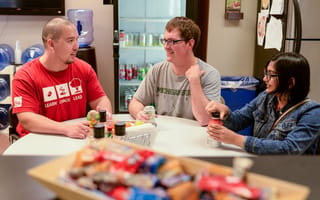
Over the course of his career as a developer, a lot of companies have asked Cameron Keif to “just make it work.”
That’s not the case at Ping Identity, where he’s now a software engineer. The company provides cloud-based security software for enterprise clients, including companies in the Fortune 100.
Keif said that he and his team are given the resources to build secure, stable products — the right way. They take seriously their process of testing and conduct rigorous code reviews.
“You hear about these companies that actually care about technical debt and setting themselves up for the future,” said Keif, “but until I started working here, I thought it was a myth.”
The company is anything but mythical, employing more than 600 people worldwide, with clients on the Fortune 100. It has also been included on Forbes’ list of “America’s Most Promising Companies.”
We asked Keif and his fellow Ping Identity engineers to share more about their work here.



FOUNDED: 2001
EMPLOYEES: 50 in Austin; 600 worldwide
OFFICES IN: Austin, Denver, Boston, San Francisco, Canada, England, France and Israel.
ABOUT PING: Its “identity-defined security” platform allows clients to give employees and partners secure, one-click access to their apps from any device. These users are given access to exactly the resources their unique identities are authorized for — and no more. The identity-centric approach is designed to allow clients to move to the cloud securely.
ABOUT THE TEAM: Provides solutions that help clients securely manage their identities — like those set up for individual employees and partners — working with open standards for identity protocols (like OAuth and OpenID) and additional APIs. The team is also building a platform to allow customers to manage large sets of identities in an API-first, cloud-optimized product.
TECH STACK: Java on the backend; React/Redux on the front end. Also Docker and Kafka.
PERKS: Flexible schedules and PTO, weekly yoga.
COMPANY OUTING: Summer boat party: people jumped off cliffs and chilled with a drink on floats in the lake.


Cameron Keif, Software Engineer
A full-stack developer on Ping Identity’s cloud team, Keif helps design architecture, perform code reviews and write automated tests for the platform.
BEYOND WORK: He admits to an obsession with fantasy hockey and hockey analytics: “I know that’s incredibly geeky – but I am a software engineer, after all!”
Describe your role.
Keif: I’m a full stack developer on our cloud team. Obviously that means I write gobs of code, but in addition, I help design architecture, do code reviews and write automated tests for our platform. I tend to focus more on the front end since that’s my background, but I work all throughout the system. I love being in an environment where I get to come into the office (or just stay home and open up my laptop) and build things from the ground up.
Name the qualities that make someone successful on this team.
Keif: Everyone on this team is incredibly driven and intelligent. When a critical issue arises or something unexpected has to be pulled into the sprint, everyone is willing to help. If someone isn’t able to meet their sprint commitments, people who have some extra bandwidth will always share some of that burden, or take time to do code reviews with quick turnaround. You have to have initiative and genuinely want to contribute, not just show up and do the minimum.
Describe an ideal candidate for this team.
Keif: Obviously knowledge of our tech stack is a plus, but it’s not the only thing I look for. I’m more interested in someone who is smart, driven and knows how to solve problems and take initiative.
I’ve had jobs at other places where the goal was: 'just make it work.' Here we are focused on building things that are strong, secure and stable."
Reflect back on when you joined this company. Is there anything about this job that surprised you?
Keif: The biggest thing is that this team, and really this company, builds things the right way. I’ve had jobs at other places where the goal was: “just make it work.” Here we are focused on building things that are strong, secure and stable. We always build solid tests, and always have really in-depth code reviews. You hear about these companies that actually care about technical debt and setting themselves up for the future, but until I started working here, I thought it was a myth.
Technology changes so rapidly, you can’t just settle into doing things the same way for a decade. You need to be willing to make changes. This team prides itself on building things the right way, and if there’s some new solution that could help us solve problems in a better way, we’re going to embrace it.


Angela Hsu, Software Engineer in Test
Hsu started as her team’s only QA person, “jumping in where I see a need.” She enjoys her work’s variety, including coding scripts to automate environment setups, manually hitting the API and UI with exploratory testing, code reviews of integration tests and troubleshooting problems with the continuous delivery pipeline.
BEYOND WORK: She's outdoorsy and loves to hike.
What's your tech stack and methodology?
Hsu: Our team uses scrum in two-week sprints. I like the agile process, and I think each “event” we have is useful, including the quick daily stand-ups, backlog refinement and sprint planning meetings. I also like the retrospectives at the end of each sprint, which allows us to tweak our process and make it better each time.
I’m not someone who wants to code eight hours a day, so I enjoy the fact that we have productive, face-to-face meetings once in awhile."
How does your day break up?
Hsu: I get a good mix of everything. I’m not someone who wants to code eight hours a day, so I enjoy the fact that we have productive, face-to-face meetings once in awhile. Our team has a daily 15-minute stand-up in the morning, and I usually get three to five hours a day to be heads-down working. If you’re feeling antsy, we have a ping pong table, and you can usually find enough people to play doubles.
What values are held on this team?
Hsu: We are always looking to improve, willing to try new ideas — and we listen to each other.

Kenneth Suter, Software Development Engineer
In addition to making Ping’s complex systems easy to use, Kenneth sees himself as a mentor and role model. Charged with creating the most reliable software possible, he also monitors Ping’s automated infrastructure.
BEYOND WORK: He’s played drums in a band for 30 years. “I love it when the neighbors (and sometimes the police) stop by and tell us we sound great.”
We know every day is different. Generally, however, how does your day break up?
Suter: Every day brings new challenges, which is part of the fun. As I get more experience, I find I write less code and spend more time helping out members of the team. We try to keep meetings short. My boss is there for me when I need her, but she trusts me to get my work done. There is always time at lunch and in the hallways to connect with people.
As I get more experience, I find I write less code and spend more time helping out members of the team."
Describe an ideal candidate for this team. Who makes a good “culture fit”?
Suter: The best candidates exhibit a mix of good communication skills and know-how. A high attention to detail and pride in one's work are essential attributes.
How do you create a team feeling?
Suter: We have some cherished traditions. Nearly every day, I have lunch with my team in the kitchen. On Tuesdays, some of us unplug and do yoga. On Wine Wednesday, we have a glass of wine and share a laugh. Fridays we start the day off right with breakfast tacos. We like to play as hard as we work. More than one of our outings has ended with a trip to the emergency room.


Anthony Dombrowski, Jr. Software Engineer
Dombrowski works with customer support to help resolve problems that might require software engineering intervention, while ensuring that the right fixes get into the right releases.
BEYOND WORK: He’s an avid football fan (Go Pack!).
What gets you out of bed in the morning?
Dombrowski: I love the thrill of the hunt! If I get a case that I think is a bug, I need to put on my detective hat and get out my map, push pins and strings of different colors to start tracking down the perp. I lose sleep at night worrying about when the perp might strike next. And I think through different theories of what’s going on and what to try next to stop them.
I love the thrill of the hunt! If I get a case that I think is a bug, I need to put on my detective hat and get out my map, push pins and strings of different colors to start tracking down the perp."
How does your day break up?
Dombrowski: I generally spend an hour at most in a meeting and the rest of the day is a mix of going over cases in my queue, playing ping pong, looking at logs, diving into the code, occasionally losing in ping pong, writing code, testing out server setups, winning in ping pong, reviewing code, helping out others (with ping pong and code or product questions), talking to my manager and seeking out others in various departments for their expertise.








